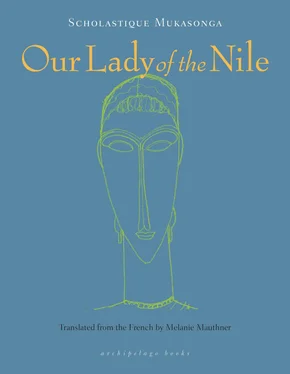The lycée is a large four-story building, higher than the government ministries in the capital. When the new girls first arrive, the ones from the countryside are afraid to get too close to the windows in the fourth-floor dorms. “Are we going to sleep perched like little monkeys?” they ask. The town girls, and the veterans, tease the new arrivals, pushing them toward the windows: “Look down there,” they say. “You’re going to fall into the lake!” Eventually, the new girls get used to it. The chapel, nearly as high as the mission church, is also made of cement, but the gym, bursar’s office, workshops, and Brother Auxile’s garage are all made of brick. They form a courtyard closed off by a wall, with a metal gate that whines when it’s opened in the morning and closed at night, much louder than the wake-up and bedtime bells.
A bit off to the side, there are some small one-story houses, some call them villas, others bungalows, where the foreign teachers live. There’s also a big house, much larger than the others, that everyone calls the Bungalow. It’s reserved for special guests, such as government ministers (should one ever come to stay), or the Bishop, whose visit is anticipated each year. Occasional tourists from the capital, or from Europe — who’ve come to see the source of the Nile — are put up there. Between these houses and the lycée, there’s a garden with a lawn, flower beds, bamboo groves, and a vegetable patch, of course. The servants who do the gardening grow cabbages, carrots, potatoes, and strawberries; there’s even a wheat plot. The tomatoes they harvest here are so pompously plump, they put the inyanya — the poor little native tomatoes — to shame. Sister Bursar likes to show visitors around the exotic orchard where the expatriated apricot and peach trees clearly hanker for their native climate. Mother Superior always says that the pupils must get used to civilized food.
A high brick wall was built to discourage intruders and thieves; and at night, guards armed with spears patrol the perimeter and stand watch by the iron gate.
After a while, the people of Nyaminombe stopped noticing the lycée. As far as they’re concerned, it’s like the huge rocks in Rutare — which seem to have rolled down the mountain and stopped there, in Rutare, for no apparent reason. Yet the construction of the lycée changed many things in the district. A flurry of covered stalls appeared by the builders’ campsite, comprising traders who had previously operated close to the mission, and others from goodness knows where. These shops sold the things shops generally sell: individual cigarettes, palm oil, rice, salt, Kraft cheese, margarine, lamp oil, banana beer, Primus lager, Fanta, and sometimes even bread, though not often. There were also bars, referred to as “hotels,” serving goat on skewers with grilled bananas and beans, and there were shacks for the loose women who brought the village into disrepute. When the lycée was completed, most of the traders left, except for three bars, two shops, and a tailor: so a new village sprang up by the path leading to the lycée. Even the market, which moved close to the workers’ shacks, stayed put, just beyond the stalls.
Yet there was one day that still drew Nyaminombe’s idle and curious to the lycée of Our Lady of the Nile, and that was the start of the school year, on a Sunday afternoon in October, at the end of the dry season. They gathered along the side of the track to admire the procession of cars bringing the students to school. There were Mercedes, Range Rovers, and enormous military jeeps, their impatient drivers hooting and waving their arms about, fierce and threatening, as they tried to overtake taxis, pickups, and minibuses so overloaded with young women that they struggled to climb the last slope.
One by one, the lycée girls tumbled out before the small throng, which was held back some way from the main gates by two district gendarmes and the mayor himself. A murmur spread through the crowd when Gloriosa stepped out of the black Mercedes with tinted windows, preceded by her mother and followed by Modesta. “She’s the spitting image of her father,” said the mayor, who had met the great man at a Party rally. “She wears the name her father gave her well: Nyiramasuka, ‘She of the Hoe.’ ” And he repeated this comment loudly enough that the party hacks pressing around him could hear it, sending a swell of admiration through the crowd. Gloriosa certainly did resemble her father, well-built and big-boned: her schoolmates nicknamed her Mastodon under their breath. She wore a navy-blue skirt, just revealing her muscular calves, and a white blouse buttoned to her neck that barely contained her generous bosom. Large round glasses only served to reinforce the unquestionable authority of her gaze. Father Herménégilde abandoned the new girls, the ones entering tenth grade, whom he had been rounding up and reassuring, then motioned to a couple of young lycée hands to take the bags from the chauffeur (who wore a short-sleeved shirt with gold buttons), and rushed toward the new arrivals, striding past Sister Gertrude on reception duty to greet mother and daughter with the customary embraces, entangling himself in the innumerable expressions of welcome that Rwandan courtesy entails. Gloriosa’s mother quickly cut him off, explaining that she simply had to greet Mother Superior before dashing back to the capital, where she was expected for dinner at the Belgian Ambassador’s, and that she was confident the lycée of Our Lady of the Nile would provide her daughter with the kind of democratic, Christian education appropriate to the female elite of a country that had undergone a social revolution, freeing it from the injustices of a feudal system.
Gloriosa announced that she would stand with Sister Gertrude at the gate, beneath the national flag, to greet the other seniors and let them know that the first meeting of the committee she chaired would take place the following day, in the refectory, after their study hour. Modesta said she’d stand guard duty along with her friend.
Soon after, Goretti also made a grand entrance, perched on the back of a huge military vehicle whose six thick tires took the spectators’ breath away. Two soldiers in camouflage fatigues helped her down, hailed the lycée hands to carry her luggage, and bade their passenger farewell with a military salute. Goretti brushed aside Gloriosa’s effusive welcome.
“Still prancing about like a minister, I see,” Goretti hissed.
“And you, think you’re Chief of Staff?” Gloriosa piped back. “Come on, move it, through the gate, and remember, we don’t speak anything but French in school: we’ll finally get to know what the Ruhengeri girls are saying.”
As the Peugeot 404 began the final climb to the lycée, Godelive recognized Immaculée, who was swathed in a wraparound and walking along, with an urchin at her heels carrying her case on his head. She immediately told her driver to stop:
“Immaculée! What happened? Get in, quick! Did your father’s car break down? You didn’t walk all the way from the capital, did you?”
Immaculée took her wraparound off and got in next to Godelive, while the driver put her case in the trunk. The little porter tapped the glass requesting his tip. Immaculée threw him a coin.
“Don’t tell a soul. My boyfriend brought me on his motorbike. He’s got a big one, you know. There’s no bigger bike than his in all Kigali, perhaps in all Rwanda. He’s so proud of it. And I’m so proud to be the girlfriend of the boy with the biggest bike in the country. I get on behind him, and he tears through the streets at full speed, the bike roaring like a lion. Everyone panics and runs for their life, the women all knock over their jugs and baskets. That makes my boyfriend laugh. He promised he’d teach me to ride his bike. Then I’ll go even faster than him. Anyway, he told me: ‘I’ll take you all the way to school on my bike.’ Sure, I tell him. I was a bit scared, though, but it was really exciting. Dad was on a business trip to Brussels. I told my mother I was going with a girlfriend. He dropped me off at the last bend, just like I asked. You can imagine the scandal if Mother Superior saw me arrive on a motorbike! I’d be expelled. But look at the state I’m in now, all red with dust. It’s horrible! They’ll think Dad doesn’t have a car anymore, that I hitched a ride on some Toyota pickup, crushed between goats and bananas, and peasant women with their kids on their backs! The shame!”
Читать дальше












